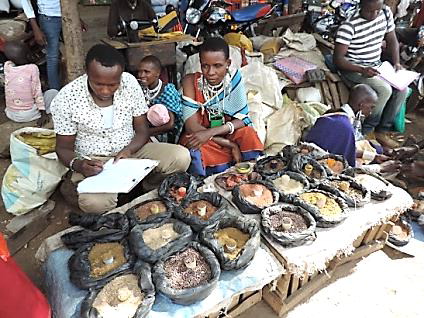This project will create and utilize two different knowledge sources on which policies, programs and activities can be based. The first will be a new knowledge base of the legal and illegal markets for plants in Kenya and Tanzania. Official records, new market surveys, and genetic analyses of plants being sold in domestic markets and trafficked across national borders will be compiled to provide a more accurate picture of the uses and over-uses of plant species. This knowledge base will be used to help enforcement agencies improve their efforts to stop poaching and illegal trafficking of endangered species; identify areas where wild plants are being illegally harvested for sale; identify potential markets for valuable cultivated plants for legal sale; and create new community-based sustainable strategies to restore and protect ecosystem services that are threatened by illegal harvesting of wild plants. The second knowledge source produced by the project will be a public reference library of DNA barcodes—short standardized DNA sequences that enable enforcement officials to identify plants that are difficult to assign to their correct species using traditional morphological features such as flowers. This component of the project builds on the success of the Barcode of Wildlife Project, led by the Smithsonian and funded by Google, in which Kenya has been a partner country. Kenya will use its demonstrated ability to generate high-quality DNA barcode records to expand the reference library to include more plant species that are endangered and protected by CITES and national law, as well as non-protected species with potential economic importance to Kenya and Tanzania.
 |
| The team carrying out survey of market samples. Photo courtesy of Dr. Khayota |
Kenya and Tanzania have great natural wealth in the form of exotic animals and plants in and outside protected areas that attract ecotourists, but these resources can generate significant additional wealth if used in new ways. Bushmeat hunting and the illegal gathering of plants from the wild are being conducted as extractive industries, not sustainable enterprises. Yet thousands of plant species are valued as herbal medicines and ingredients in skin care products, ornamentals for landscapes, and as cut flowers, sacramental elements in traditional and religious ceremonies, and for other uses.
Illegal harvesting and over-exploitation is reducing the economic benefits and development opportunities that Kenya and Tanzania can obtain from their rich biodiversity. This project seeks to change the balance with new knowledge-based policies and activities. The proposed knowledgebase of legal and illegal plant trade will be used to help identify species, populations, and ecosystems at risk from over-harvesting and suggest plant species that could be domesticated and marketed to improve livelihoods.
Project results could also support new policies for community-based ecosystem development projects leading to increased ecotourism and farming, promote biodiversity conservation, and raise awareness among the public and government officials regarding plant poaching and its cost to national economies.
Final Summary of Project ActivitiesThe project demonstrated the effective use of DNA technology in combating wildlife crime, enhancing regional capacity, both in Kenya and Tanzania, in its application. It improved understanding of DNA barcoding processes crucial for enforcement, including formulation, data generation, and interpretation, and is now being used to prosecute traffickers in courts. DNA barcoding technology also facilitated improved labeling, traceability, and legal trade of authentic wildlife products, alongside enhanced MEAS reporting. Data generated from the project will be uploaded to GenBank for use in wildlife prosecution efforts.
The project also advanced understanding in formulating legislation and policies for effective wildlife trade enforcement. It developed a comprehensive training curriculum, serving as a crucial resource for ongoing capacity building initiatives in the region for stakeholders, including wildlife senior managers, legal officers, and prosecutors on the importance of DNA technology in wildlife crime prevention. A ten-day DNA barcoding training was conducted in Eastern and Southern Africa for ten middle-level officers from government institutions in Kenya, Uganda, and Madagascar. In Tanzania, efforts are underway to amend wildlife legislation to incorporate processes related to non-human DNA.
PublicationsHilonga, S., Otieno, J. N., Ghorbani, A., Pereus, D., Kocyan, A., & de Boer, H. (2019). Trade of wild-harvested medicinal plant species in local markets of Tanzania and its implications for conservation. South African Journal of Botany, 122, 214–224.
https://doi.org/10.1016/j.sajb.2018.08.012
Back to PEER Cycle 4 Grant Recipients 



